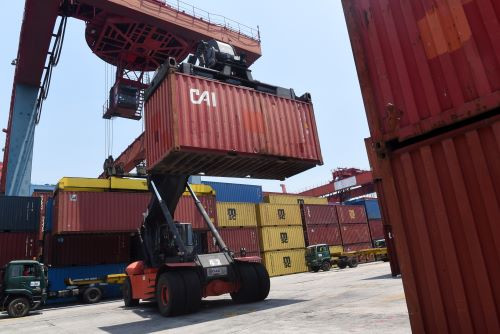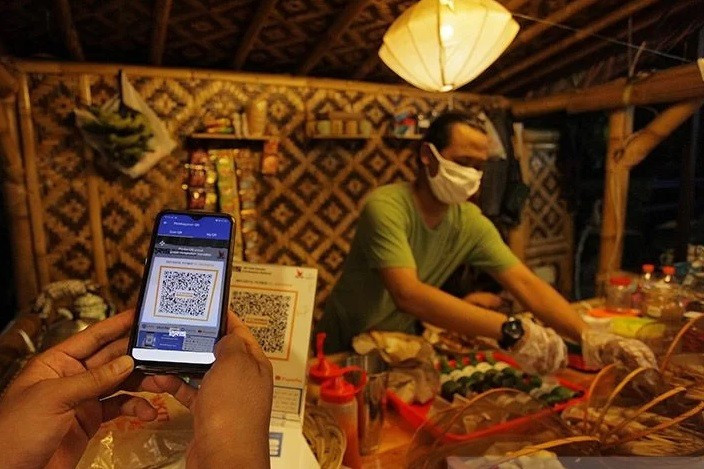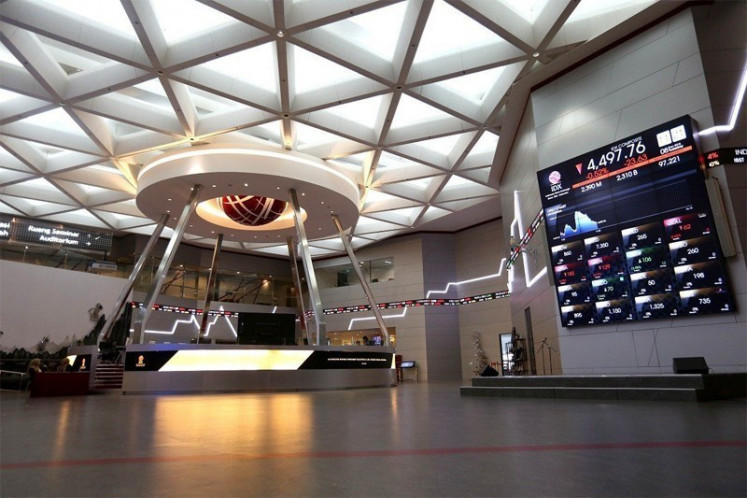Popular Reads
Top Results
Can't find what you're looking for?
View all search resultsPopular Reads
Top Results
Can't find what you're looking for?
View all search resultsScale or sink: How to compete in new global trade era
The “reform” and “deregulation” initiated by the government sends a clear message that Indonesia is positioning itself as an open and competitive player in a newly adversarial trade environment.
Change text size
Gift Premium Articles
to Anyone
W
hen United States President Donald Trump announced a sweeping return to reciprocal tariffs on April 3, it was a shot across the bow of the global economic order, a signal that the age of free market economy is over and we are now navigating a more pragmatic world driven by transactional principles.
The global markets responded with a collective shudder. Within 48 hours, US$5 trillion in equity value vanished from the world’s stock exchanges. The S&P 500 plunged, and Asian markets unraveled. Upon reopening after a long holiday, Indonesia’s composite index fell 9.19 percent, triggering a 30-minute trading halt.
Indonesia has weathered many crises before, from the commodity crash of the 1980s, the Asian Financial Crisis of the 1990s, the 2008 global recession, to the recent COVID-19 pandemic. Each time, we have proven our resilience.
While we may not yet define the current situation as a crisis, the escalating global trade tensions could easily evolve into one if not addressed strategically. That is why this moment matters, and we must act differently to make sure we seize this moment as an opportunity for growth.
For decades, the foundation of the global economy was a set of shared assumptions: Trade liberalization was key for growth and multilateralism was good. Those assumptions are now collapsing under the weight of neo-mercantilist strategy and Asia bears the brunt of the US tariff increases. Within the region, China face duties of up to 125 percent, while Southeast Asian countries contend with hikes between 10 percent and 49 percent.
To deal with this, we must think like a business too. And like in any business deal, there’s always room to negotiate.
Just as the US is pulling inward with a more protectionist stance, Indonesia takes a bold step forward through practical and adaptive reforms. President Prabowo Subianto’s administration has moved swiftly to dismantle certain import quotas, relax domestic content requirements (TKDN) and lower import duties.
These policies are part of the government's endeavor for “reform” and “deregulation”, sending a clear message that Indonesia is positioning itself as an open and competitive player in a newly adversarial trade environment and that Indonesian companies must step up and compete in the more challenging global market.
But what does this mean for businesses? In short: More competition, more urgency to innovate and more opportunity, if we act fast and strategically.
First, more competition means businesses need to compete smart and complement the value chains.
Import quotas and TKDN relaxation will inevitably invite more foreign players into the domestic market. For example, sectors like automotive or electronics may see a greater influx of imported components. Instead of resisting this shift, businesses should explore complementary roles in the supply chain, focusing on assembly, downstream integration or services tied to those imported products.
Second, adaptation through innovation, because you either scale or sink. Companies must innovate or be priced out. The clear path forward is through technological adoption, cost-efficiency and economies of scale, to remain price-competitive both at home and abroad.
Third, capture new market share by replacing high-tariff producers.
As tariffs make certain exporters less competitive, trade diversion opens up new markets for Indonesia. Our neighbor Vietnam is now facing US tariffs of up to 46 percent on specific products. This creates a window of opportunity for Indonesia to position itself as an alternative supplier in sectors such as footwear and apparel, to supply gaps and reduce risks of a trade deficit.
Last but not least, seize the free trade agreements (FTAs) and economic alliances at hand.
In the spirit of Asia-Africa Cooperation Month, it signals a shift to increase medium and long-term trade diversification and the emergence of a new, inclusive multilateralism. For Indonesia, it is time to deepen partnerships with non-traditional markets across the African region, the Middle East and South Asia. These regions are not only growing rapidly, but are also increasingly open to South-South cooperation, infrastructure investment and digital trade.
The changing trade environment makes it critical for Indonesia to capitalize on existing and upcoming FTAs and regional blocs. The Trade and Investment Framework Agreement (TIFA) with the US should not only be viewed as a tool to ease tariff pressures, but as a gateway to broader market access for strategic sectors.
At the same time, accelerating the finalization of the Indonesia-European Union Comprehensive Economic Partnership Agreement (CEPA) is essential. This pact holds the potential to unlock smoother export routes for high-tariff commodities such as palm oil, timber and coffee, all of which are central to Indonesia’s trade interests in Europe.
Meanwhile, within the region, stronger economic integration is crucial to enhancing supply chain connectivity, reducing trade barriers and fostering collective growth. Moreover, as Malaysia takes the helm of ASEAN’s 2025 chairmanship, Indonesia must lead efforts to deepen regional integration, particularly in areas like intra-ASEAN investment, science and technology cooperation and digital trade. By balancing global outreach with strong regional alliances, Indonesia can secure its place as a key player in the evolving global economy.
The question is, how should we prepare for this?
The government must take the lead in branding Indonesia not just as a low-cost producer, but as a reliable friend-shoring destination. This involves offering competitive investment incentives, including low-tax packages for companies relocating from high-tariff regions, while also developing strategic industrial zones aligned with global demand in sectors like EV batteries, semiconductors and halal products. Simplified licensing, streamlined bureaucracy and performance-based incentives are also important enablers, as relocation opportunities will not materialize if regulatory frictions persist.
We also must urgently address human capital challenges, particularly the shortage of specialized skills in high-tech industries. This calls for a national push to expand vocational training, incentivize upskilling and foster industry-led apprenticeship programs.
Equally important is the need to ensure policy cohesion between micro, small and medium enterprises (MSMEs) and large industries through clear, integrated roadmaps, to ensure that the growth of Indonesia’s industrial base is inclusive.
Indonesia must no longer play a passive role in global trade dynamics. While new tariffs may have exposed challenges, they also highlight opportunities for strategic growth and transformation. With the right combination of policy reform, business readiness and government support, Indonesia can transition to actively taking the lead in global trade rather than merely reacting to it.
***
The writer is a former chairman of the Indonesian Chamber of Commerce and Industry (Kadin).











